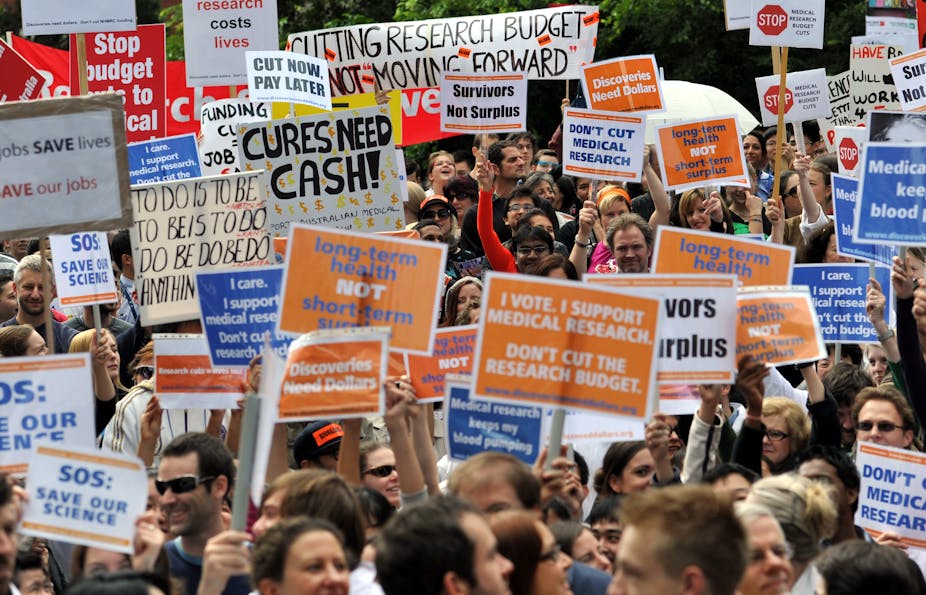Recent rumors of looming cuts to the National Health and Medical Research Council budget have jump-started a much-needed national discussion about health and medical research policy in Australia.
Unfortunately, so far the argument has largely missed the point in two important ways. First, participants are obsessed with profit rather than progress. Second, advocates are arguing over the amount of medical research, rather than the quality of that research.
1. Profit = health?
Why do countries use public money to support medical research?
Much of the debate in recent days would suggest that the primary aim is to prop up the pharmaceutical and medical technology industries, thereby spurring economic growth and global competitiveness.
An editorial in The Age went so far as to claim that “rich countries invest heavily in health research not just because they can but because their wealth depends on it.”
Many others have pointed to the potential job losses and other negative economic impacts that might result from major funding cuts.
In short, the argument goes, publicly funded research leads to private profit.
But wait a second… does profit lead to better health? Wealth and health may be connected (though the connection is far from straightforward). But if the medical research establishment’s only means of improving health is via wealth creation, then we are in a very sorry situation.
The explicit motivation for medical research is better health outcomes. The NHMRC’s own mission statement is about health, not economic growth. It claims to be “Working to build a healthy Australia.”
Similarly, the US National Institutes of Health (NIH) aim to “enhance health, lengthen life, and reduce the burdens of illness and disability.”
Neither of these organisations has economic profit as a central feature of its mission. If Australia’s medical research investment is doing what it is supposed to do, there should be a much clearer and more direct connection between medical science and health outcomes.
Regardless of its merit, the profit argument completely misses the point of medical research funding.
By downplaying their core mission in favor of economic arguments, scientists and other advocates are playing a dangerous game.
Do they really want to compete with the full range of policy alternatives that could also be effective in creating jobs and raising GDP?
2. Medical research = better health?
Some are arguing that a $400 million cut would spell disaster for health in Australia. But what about the reverse scenario? Would adding $400 million dramatically improve health? How about $4 billion? Or $40 billion?
It seems intuitive that a larger government investment in health and medical research would yield better health outcomes for the country, but in reality this connection is very difficult to demonstrate.
For example, the US has long outspent every other country on medical research by any measure (e.g. raw total, per capita, % GDP, etc), yet it lags behind other developed countries in many important health outcomes, including life expectancy.
Meanwhile, Australia does far better than the US in those same categories, despite spending much less on medical research.
This suggests that at the macro level, a country’s budget for medical research says very little about the health of its population.
Bhaven Sampat, an economist and expert on health and innovation policy, reviewed various attempts to show that science funded by the NIH is directly responsible for improved outcomes and concluded: “there is little econometric evidence [that] NIH-funded basic research has played an important role in improvement in health outcomes over the past half-century.”
This does not mean, he points out, that such a relationship does not exist, but “clearly, more work is needed on this front.”
As the US example painfully demonstrates, increasing research budgets are not enough to ensure better health. To build a lasting case for medical research funding in Australia, advocates will need to do a few things:
explain how the investment promotes better health;
back that up with solid evidence; and
demonstrate that the research enterprise can respond effectively to the needs of the health system, rather than simply pursuing scientific opportunity.
Doing so requires focusing on quality, not just quantity, and avoiding the alluring but irrelevant “profit-equals-progress” assumption.
Nobody disputes the idea that the government should fund medical research. But in these times of tightening budgets, some might protest the idea that medical research is somehow more deserving of your tax dollars than, say, actual medicine, national security, early childhood education, or crime prevention.
To show that medical research is somehow more important than everything else would require a pretty compelling argument.
Further Reading:
Sampat, Bhaven N. (2009) “The Dismal Science, The Crown Jewel and the Endless Frontier: An Economist’s Perspective on the NIH” in D. Foray, ed., The New Economics of Technology Policy. Edward Elgar
Crow, Michael M. (2011) “Time to rethink the NIH.” Nature. 471, 569-571.
Some of Ryan’s blog posts on health research policy can be accessed here.
Do you agree that profit should not be used to justify medical research funding?

